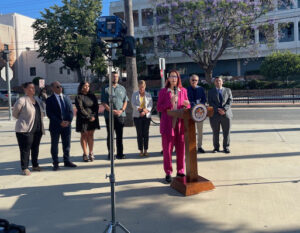
File photo
By Mary O’KEEFE
There are quite a few new laws that will go into effect in California this year, and they deal with a variety of issues from social media to housing and what kids are taught in school. Here are just a few new laws to be aware of:
AB587 requires social media companies to post terms of service, including company contact information, for users with questions about terms of service, the process that will be used by the company that users must follow to flag content, groups or other users that they believe violate the terms of service and a list of potential actions the social media company may take against an item of content or a user.
The companies must submit a service report to the office of the California Attorney General that must include the current version of the terms of service of the social media platform and a detailed description of any changes to their terms of service among other requirements.
As is imagined some social media companies are not at all happy with this requirement for transparency including X, formerly known as Twitter, owner Elon Musk who asked the courts for a preliminary injunction regarding AB587. U.S. District Judge William B. Schubb denied the motion.
There is a lot about housing; here are just a few:
AB12, starting in July, prohibits landlords from charging more than one month’s rent as deposits.
SB4 Starting on Jan. 1, 2024 SB4 allows churches, faith institutions and non-profit colleges to build affordable housing on their land and bypass most local permitting and environmental review ordinances/rules.
SB423 continues SB35, which was set to expire soon, and streamlines multifamily housing production in cities and counties that are failing to build their fair share of state housing.
Other laws include:
AB1288 prohibits employers from discriminating against a person in hiring, terminating or any term or condition of employment or otherwise penalizing a person for using marijuana off the job and away from the workplace. Typically, THC (tetrahydrocannabinol) is detectable for up to 90 days in hair, and anywhere from one day to a month or longer in urine. Therefore, some tests do not show that a person is under the influence at the moment of the test. This law passed in 2022 but went into effect on Jan. 1. There are exceptions for construction workers and companies that must conduct drug tests as part of federal contracts. The bill does not allow employees to possess, be impaired or use cannabis while at work.
SB478 goes into effect in July. This will require websites to show the cost of a service or item up front. This includes charges from hotels, short-term rental stays, event tickets and food delivery services.
AB436 stops cities and counties from imposing cruising bans on city streets.
SB345 provides legal protections for health care practitioners in California who provide or dispense medication or other services for abortion, contraception or gender-affirming care to out-of-state patients.
SB616 Previously employers were required to provide three days of paid sick leave annually; that changed on Jan. 1 with an increase to five paid sick days per year.
AB701 This law increases the penalty for selling or distributing more than one kilogram of fentanyl with an automatic addition of three years added to the original sentence. The penalties continue to increase by weight with a maximum of an additional 25 years for trafficking in weights exceeding 80 kilograms.
SB848 requires businesses to grant employees up to five days following a reproductive loss, including a miscarriage, stillbirth or failed adoption, in-vitro fertilization or surrogacy. The law applies to both people in the couple.
AB645 was passed with bipartisan support and would allow cameras in areas where known traffic issues occur like near school zones and safety corridors. They will not be placed on freeways. These cameras would automatically capture the license plate information and ticket drivers who are traveling at least 11 miles per hour over the posted speed limit. The first violation up to 15 mph over the posted limit will be a warning; the second time a citation of $50 is sent to the owner of the vehicle. The charges will increase slightly with every 10 miles traveled over the speed limit.
AB873 highlights the growing reliance of news consumed by young people on the internet and social media. This law would integrate media literacy instruction into the core subjects that all students learn from kindergarten through 12th grade. The law was in effect on Jan. 1; however, students will not immediately see a disruption to their curriculum. This law starts the work of updating the curriculum to encompass the subject. New Jersey, Texas and Delaware have passed similar legislation on media literacy.
